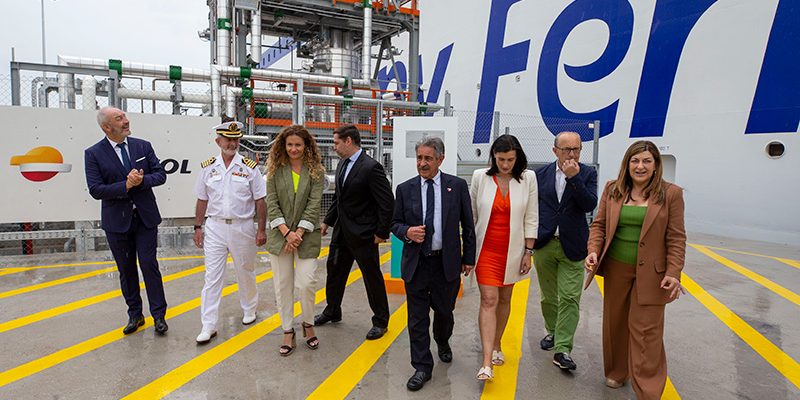Repsol opened its new LNG terminal in the Port of Santander. The opening ceremony was headed by the acting president of Cantabria, Miguel Ángel Revilla. The facility, which is co-financed by the European Commission through the CEF-Connecting Europe Facilities Program, involved an investment of 16 million euros and adds to the set of actions carried out or currently underway at the port facility.
“The best for the port is yet to come,” said Revilla. The official also thanked Repsol for its commitment to the Port of Santander and to the energy transition and for partnering with Brittany Ferries. In fact, the Santoña ship of the French shipping company is the first to make use of the new LNG terminal, which allows the vessel a CO2 reduction of more than 12,000 tons per year.
Moreover, Repsol’s General Director of Industrial Transformation and Circular Economy Juan Abascal assured that this new terminal, “the best LNG infrastructure in Europe”, is another step in the company’s commitment to the energy transition and the decarbonization of the maritime sector. Equipment that, he added, contributes to the goal of reaching net zero emissions by 2050 and facilitates Brittany Ferries’ LNG bunkering operations in northern Spain.
The new plant has a cryogenic tank with a storage capacity of 1,000 cubic meters and joins the terminal that the company has in the port of Bilbao. Both are part of the collaboration agreement that Repsol signed with Brittany Ferries in 2019 for the supply of LNG as maritime fuel for its operations in Spain.
In the design of the Santander terminal, operational flexibility has prevailed, in order to allow access to any type of vessel for the bunkering of LNG. In addition, the facility allows the simultaneous loading of passengers and refueling, optimizing operations on land and in maritime traffic, which entails a reduction in emissions in port operations.
Repsol has extensive experience in this type of operation and in recent years has carried out more than 150 LNG bunkering operations to 32 different ships in eight Spanish ports.
Source: Repsol







